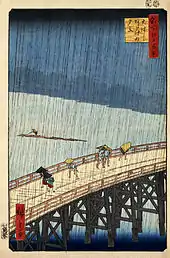Japonaiserie (Van Gogh)
Japonaiserie (English: Japanesery) was the term the Dutch post-impressionist painter Vincent van Gogh used to express the influence of Japanese art.[1]
| The Courtesan (after Eisen) | |
|---|---|
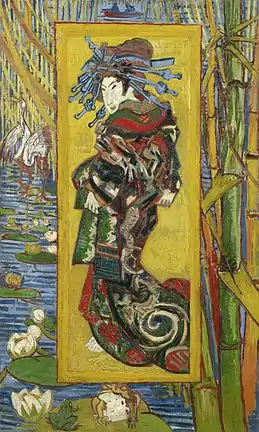 | |
| Artist | Vincent van Gogh |
| Year | 1887 |
| Catalogue | |
| Medium | Oil on canvas |
| Dimensions | 105.5 cm × 60.5 cm (41½ in × 23¾ in) |
| Location | Van Gogh Museum, Amsterdam |
Before 1854, trade with Japan was confined to a Dutch monopoly and Japanese goods imported into Europe were for the most part confined to porcelain and lacquer ware. The Convention of Kanagawa put an end to the 200-year-old Japanese foreign policy of Seclusion and opened up trade between Japan and the West.
Artists including Manet, Degas and Monet, followed by Van Gogh, began to collect the cheap colour wood-block prints called ukiyo-e prints. For a while Vincent and his brother Theo dealt in these prints, and they eventually amassed hundreds of them, now housed in the Van Gogh Museum, Amsterdam.[2]
In a letter to Theo dated about 5 June 1888 Vincent remarks
About staying in the south, even if it’s more expensive—Look, we love Japanese painting, we’ve experienced its influence—all the Impressionists have that in common—[so why not go to Japan], in other words, to what is the equivalent of Japan, the south? So I believe that the future of the new art still lies in the south after all.[3]
A month later he wrote,
All my work is based to some extent on Japanese art...[4]
Influence of Japanese art on Van Gogh
Van Gogh's interest in Japanese ukiyo-e woodblock prints dates from his time in Antwerp when he was also immersing himself in Delacroix's theory of colour and where he used them to decorate his studio. Vincent possessed twelve prints from Hiroshige's series One Hundred Famous Views of Edo and he also had bought Two Girls Bathing by Kunisada II, 1868. These prints had an increasing influence on his whole development.[5]
One of De Goncourt's sayings was "Japonaiserie for ever". Well, these docks [at Antwerp] are one huge Japonaiserie, fantastic, singular, strange ... I mean, the figures there are always in motion, one sees them in the most peculiar settings, everything fantastic, and interesting contrasts keep appearing of their own accord.[6]
During his subsequent stay in Paris, where Japonisme had become a fashion influencing the work of the Impressionists, he began to collect ukiyo-e prints and eventually to deal in them with his brother Theo. At that time he made three copies of ukiyo-e prints, The Courtesan and the two studies after Hiroshige.
Van Gogh developed an idealised conception of the Japanese artist which led him to the Yellow House at Arles and his attempt to form a utopian art colony there with Paul Gauguin.
His enthusiasm for Japanese art was later taken up by the Impressionists. In a letter of July 1888 he refers to the Impressionists as the "French Japanese".[7] He strongly admired the techniques of Japanese artists, writing to Theo in September 1888:
I envy the Japanese the extreme clarity that everything in their work has. It's never dull, and never appears to be done too hastily. Their work is as simple as breathing, and they do a figure with a few confident strokes with the same ease as if it was as simple as buttoning your waistcoat.[8]
Van Gogh's dealing in ukiyo-e prints brought him into contact with Siegfried Bing, who was prominent in the introduction of Japanese art to the West and later in the development of Art Nouveau.[9]
Characteristic features of ukiyo-e prints include their ordinary subject matter, the distinctive cropping of their compositions, bold and assertive outlines, absent or unusual perspective, flat regions of uniform colour, uniform lighting, absence of chiaroscuro, and their emphasis on decorative patterns. One or more of these features can be found in numbers of Vincent's paintings from his Antwerp period onwards.
The Courtesan (after Eisen)
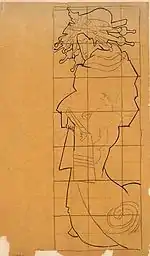
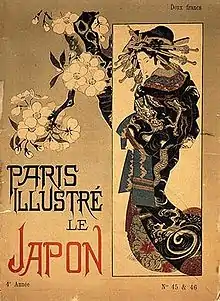
The May 1886 edition of Paris Illustré was devoted to Japan with text by Tadamasa Hayashi who may have inspired van Gogh's utopian notion of the Japanese artist:
Just think of that; isn't it almost a new religion that these Japanese teach us, who are so simple and live in nature as if they themselves were flowers? And we wouldn't be able to study Japanese art, it seems to me, without becoming much happier and more cheerful, and it makes us return to nature, despite our education and our work in a world of convention.[10]
The cover carried a reverse image of a colour woodblock by Keisai Eisen depicting a Japanese courtesan or Oiran. Vincent traced this and enlarged it to produce his painting.
Copies of Hiroshige prints
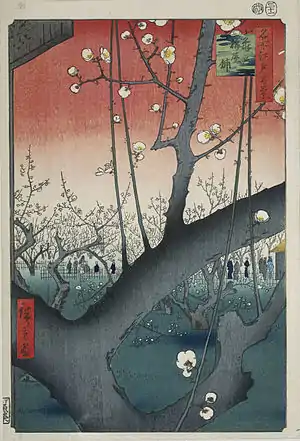
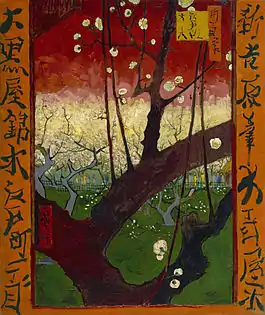
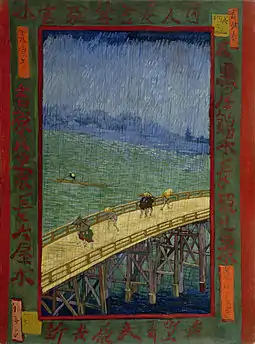
Van Gogh made copies of two Hiroshige prints. He altered their colours and added borders filled with calligraphic characters he borrowed from other prints.[11]
Example ukiyo-e colour woodblock prints
- Eisen: The Feast of Seven Herbs.[12]
- Eisen and others: 22 Japanese woodcuts, Connecticut College, Connecticut
- Eisen: Opening Night in the Theater District for Two Theaters of Edo (Edo ryôza Shibai-machi kaomise no zu).[13]
- Hiroshige: Sudden Shower over Atake (1857), Brooklyn Museum, New York
- Hiroshige: Plum Estate, Kameido (1857), Brooklyn Museum, New York
- Hiroshige: Maple Trees at Mama, Tekona Shrine (1857), Brooklyn Museum, New York
- Hiroshige: Ushimachi, Takanawa (1857), Brooklyn Museum, New York
- Hiroshige: Fireworks at Ryōgoku (1857), Brooklyn Museum, New York
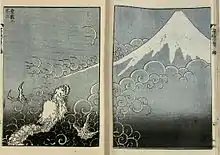
- Hiroshige: Yui, Satta Peak.[14]
- Hiroshige: (various).[15]
- Hokusai: Abe No Nakamaro, Fitzwilliam Museum, Cambridge
- Hokusai (attrib.): The Shishi-Mai Dance, Royal Academy of Arts, London
- Sharaku: The Actors Nakamura Wadaemon and Nakamura Konoz.[16]
- Utamaro: Girl at her Toilet with two female attendants and male admirer, Birmingham Museums and Art Gallery, Birmingham
- Utamaro: Women sewing.[17]
- Utamaro: Picture Book of Crawling Creatures (1788)s, Fitzwilliam Museum, Cambridge
Illustrative Van Gogh oil paintings on canvas
In the Van Gogh Museum, Amsterdam
- Houses seen from the Back (1885, Antwerp).[18]
- The Courtesan (1887).[19]
- The Bridge in the Rain (after Hiroshige), (1887).[20]
- Flowering Plum Orchard (after Hiroshige), (1887).[21]
- Sprig of Flowering Almond in a Glass (1888).[22]
- The Bedroom (1888).[23]
- Fishing Boats on the Beach at Les Saintes-Maries-de-la-Mer (1888).[24]
- The Rock of Montmajour with Pine Trees (1888), pen and brush.[25]
- The Langlois Bridge (1888).[26]
- The Harvest (1888).[27]
- The Sower (1888).[28]
- Almond Blossom (1890).[29]
Outside the Netherlands
- Vincent's Chair with Pipe (1888), National Gallery, London
- Sunflowers (1888), National Gallery, London
See also
References
- "Search result". Vincent van Gogh. The Letters. Amsterdam: Van Gogh Museum.
- "Japanese prints: Catalogue of the Van Gogh Museum's collection". Amsterdam: Van Gogh Museum.
- "Letter 620". Vincent van Gogh. The Letters. Amsterdam: Van Gogh Museum.
- "Letter 640". Vincent van Gogh. The Letters. Amsterdam: Van Gogh Museum.
- Hammacher, Renilde (1982). Van Gogh, A Documentary Biography. New York: Macmillan Publishing CO., INC. pp. 135, 151. ISBN 0-02-547710-2.
- "Letter 545". Vincent van Gogh. The Letters. Amsterdam: Van Gogh Museum.
- "Letter 642". Vincent van Gogh. The Letters. Amsterdam: Van Gogh Museum.
- "Letter 686". Vincent van Gogh. The Letters. Amsterdam: Van Gogh Museum.
- "Search result". Vincent van Gogh. The Letters. Amsterdam: Van Gogh Museum.
- "Letter 686 note 21". Vincent van Gogh. The Letters. Amsterdam: Van Gogh Museum.
- 'Utagawa, Japonaiserie and Vincent Van Gogh' in: Forbes, Andrew; Henley, David (2014). 100 Famous Views of Edo. Chiang Mai: Cognoscenti Books. ASIN: B00HR3RHUY
- "The Feast of Seven Herbs (Imayo musume nanakusa)". State Hermitage Museum, St. Petersburg. Retrieved 10 January 2017.
- "Opening Night in the Theater District for Two Theaters of Edo (Edo ryôza Shibai-machi kaomise no zu)". Museum of Fine Arts, Boston. Retrieved 10 January 2017.
- "No 17 Yui, Satta-mine 由井薩埵嶺 (Yui: Satta Peak) / Tokaido gojusan-tsugi no uchi 東海道五拾三次之内 (Fifty-Three Stations of the Tokaido Highway)". British Museum. Retrieved 10 January 2017.
- "Ando Hiroshige". Hiroshige.org. Retrieved 10 January 2017.
- "The Actors Nakamura Wadaemon and Nakamura Konoz". British Museum. Retrieved 10 January 2017.
- "Utamaro: Women sewing". British Museum. Retrieved 10 January 2017.
- "Houses Seen from the Back". Van Gogh Museum, Amsterdam. Retrieved 10 January 2017.
- "Courtesan (after Eisen)". Van Gogh Museum, Amsterdam. Retrieved 10 January 2017.
- "Bridge in the Rain (after Hiroshige)". Van Gogh Museum, Amsterdam. Retrieved 10 January 2017.
- "Flowering Plum Orchard (after Hiroshige)". Van Gogh Museum, Amsterdam. Retrieved 10 January 2017.
- "Sprig of Flowering Almond in a Glass". Van Gogh Museum, Amsterdam. Retrieved 10 January 2017.
- "The Bedroom". Van Gogh Museum, Amsterdam. Retrieved 10 January 2017.
- "Fishing Boats on the Beach at Les Saintes-Maries-de-la-Mer". Van Gogh Museum, Amsterdam. Retrieved 10 January 2017.
- "The Rock of Montmajour with Pine Trees". Van Gogh Museum, Amsterdam. Retrieved 10 January 2017.
- "The Langlois Bridge". Van Gogh Museum, Amsterdam. Retrieved 10 January 2017.
- "The Harvest". Van Gogh Museum, Amsterdam. Retrieved 10 January 2017.
- "The Sower". Van Gogh Museum, Amsterdam. Retrieved 10 January 2017.
- "Almond Blossom". Van Gogh Museum, Amsterdam. Retrieved 10 January 2017.
External links
- Krikke, Jan. "Vincent van Gogh: Lessons from Japan". The Vincent van Gogh Gallery. Retrieved 2010-08-25.
- "Japonism". Van Gogh Museum, Amsterdam. Retrieved 14 January 2017.
| Wikimedia Commons has media related to Japonaiserie, Vincent van Gogh serie. |
